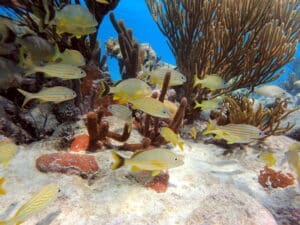
A school of grunts explores a shallow reef at Carrie Bow Cay, Belize, one of Smithsonian MarineGEO’s long-term research sites. (Credit: Ross Whippo)
Are fish in the Chesapeake as hungry as fish in Chile? Are marine communities in Alaska more resistant to invasive species than those in Panama or Chile? And can saving marine biodiversity help protect the ocean from climate change?
Eleven years ago, Smithsonian scientists launched the Marine Global Earth Observatory (MarineGEO): a global network of partners dedicated to studying what makes marine ecosystems tick—and how they will respond to a changing climate. Starting with just four field sites in the Americas, today MarineGEO collaborators come from five continents. On Feb. 20, take a tour of the world’s coastal waters with Dr. Martin Thiel, managing director of the MarineGEO network. He will reveal what MarineGEO has learned about keeping marine ecosystems working, and where we can best place our hope for the future of the ocean. Part of the Smithsonian Environmental Research Center’s free “Life On A Sustainable Planet” webinar series.
This webinar will be recorded! Closed captions will be available during the live event and on the recording. By signing up on Zoom, you’ll be able to join live and receive a link to the recording approximately 1 week after the live webinar.
